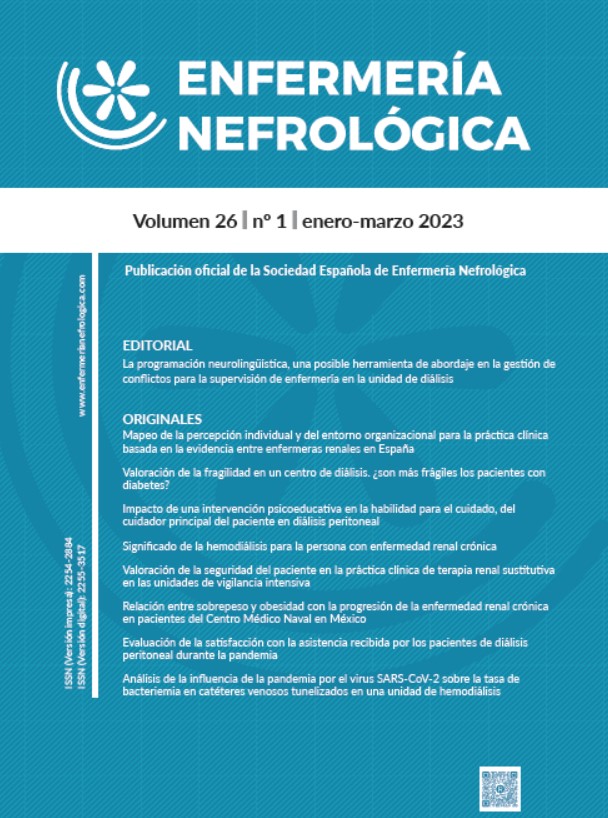Contenido del artículo principal
Resumen
La enfermera que asume la responsabilidad de la supervisión de una unidad de diálisis debería saber, que se enfrentará a lo largo de su ejercicio profesional con múltiples conflictos, que podríamos incluso considerar arquetípicos. A la supervisión se le exige como requisitos de formación complementaria la gestión por procesos, liderazgo y desarrollo de personas y resolución de conflictos.
En los conflictos considero que las características más importantes a destacar es que son inevitables, siempre gestionables e imprescindibles para crecer en un equipo.
El rol principal de la supervisión de enfermería en la gestión de conflictos, es conseguir resolverlo de forma funcional, lo que significa, que la resolución ayuda a caminar hacia la maduración del equipo, a fomentar el análisis crítico y a promover el cambio y la creatividad. La supervisión es el agente activo en habilidades de gestión que deberá evitar una resolución disfuncional que mantiene la tensión, los comportamientos negativos, la posible distorsión de la realidad y la reducción de la colaboración. Convertirse en este agente activo implica realizar una formación proactiva, consciente y continua. Significa “me responsabilizo de atender mi desarrollo” y “me dedico respetuosamente a transformarme”.
La programación neurolingüística aglutina estrategias para el desarrollo personal con un enfoque eminentemente práctico.
Palabras clave
Detalles del artículo

Esta obra está bajo una licencia internacional Creative Commons Atribución-NoComercial 4.0.
Aviso de derechos de autor/a
© Los autores ceden de forma no exclusiva los derechos de explotación de los trabajos publicados y consiente en que su uso y distribución se realice con la Licencia Creative Commons Atribución - No comercial 4.0 Internacional (CC BY-NC 4.0). Puede consultar desde aquí la versión informativa y el texto legal de la licencia. Esta circunstancia ha de hacerse constar expresamente de esta forma cuando sea necesario.
Referencias
- Robert Dilts El poder de la palabra PNL. Ediciones Urano. Barcelona; 2003.
- Allan Santos, Enric Lladó. El libro grande de la PNL. Rigden institut Geltalt. Madrid; 2012.
Referencias
Robert Dilts El poder de la palabra PNL. Ediciones Urano. Barcelona; 2003.
Allan Santos, Enric Lladó. El libro grande de la PNL. Rigden institut Geltalt. Madrid; 2012.




